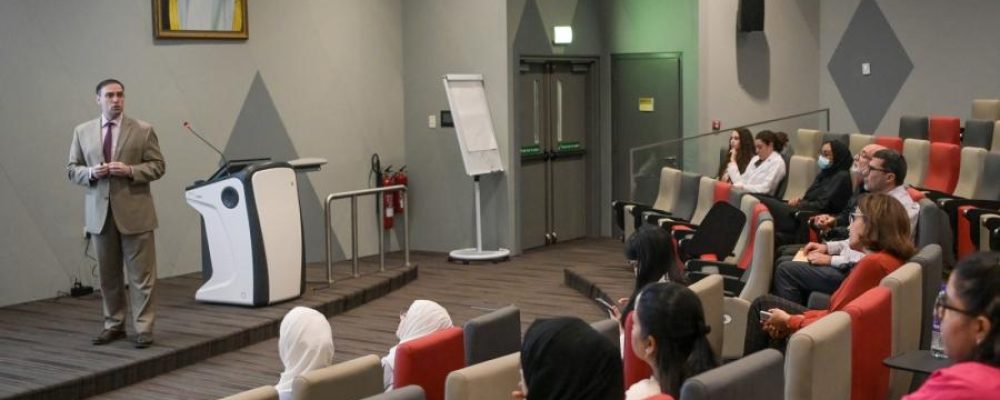As researchers from American University of Sharjah (AUS) continue to make innovative breakthroughs in cancer treatment research. Renowned AUS professor Dr. Ghaleb Husseini recently delivered an insightful lecture on targeted drug delivery in cancer treatment as part of the College on Engineering’s (CEN) lecture series, highlighting his novel work in the area of ultrasonic drug delivery.
A faculty member from the AUS Department of Chemical and Biological Engineering, Professor Husseini is a leading researcher in the field of ultrasonic drug delivery. His work involves developing new drug delivery systems to minimize the side effects of chemotherapy. By encapsulating the chemotherapeutic agent in a nano-sized carrier until it reaches the tumor site, the body’s healthy cells can avoid interaction with the cancer-fighting drugs.
AUS’ ongoing research endeavors involve the Drug Delivery Research Group, whose members are investigating novel ways to enhance drug delivery to cancer cells. In addition to using ultrasound as a trigger mechanism, the team is employing the biological lock-and-key (receptor binding) mechanism to improve the accumulation and targeting of drugs at the tumor site. By adding a key to the surface of the nanocarrier that fits the locks (receptors) on the surface of cancer cells, the researchers hope to increase the effectiveness of the treatment while minimizing side effects.
The Drug Delivery Research Group, established in 2012, comprises AUS faculty, graduate and undergraduate students, and post-doctoral associates. The group is currently running experiments to find the most effective ultrasound parameters (frequency, ultrasound strength and pulse duration) and has applied for a patent on the use of antibodies (i.e., the key being an antibody) on the surface of nanocarriers and ultrasound in treating breast cancer.
“Targeted drug delivery using ultrasound is a promising approach to reduce the side effects of chemotherapy and improve the efficacy of cancer treatment. Our research aims to develop safe and effective nanocarriers that can selectively deliver chemotherapeutic agents to the tumor site, while sparing healthy tissues. I am excited to share our findings and discuss the potential impact of this technology on cancer patients’ lives,” said Professor Husseini.
During the lecture, Professor Husseini presented his latest findings indicating that targeted and ultrasound drug delivery improve in vitro delivery by 200 percent compared to the technology currently being employed in clinics and shared his insights on targeted drug delivery in cancer treatment. In addition to discussing the benefits of targeted drug delivery, Professor Husseini provided valuable information on the process of obtaining a US patent in this research domain.
Dr. Rana Sabouni, Associate Professor in the AUS Department of Chemical and Biological Engineering, hosted the lecture and expressed her enthusiasm about it, saying, “I am thrilled to have had the opportunity to welcome Professor Husseini to our CEN Lecture Series to share his ground-breaking research work in targeted drug delivery for cancer treatment. Our lecture series is dedicated to bringing together experts from various fields of engineering to share their knowledge and insights with AUS’ community. I am proud to be part of a university that values and supports innovative research.”
The CEN Lecture Series organized by the AUS College of Engineering is a platform for leading researchers and experts in various fields of engineering to share their knowledge and insights with students, faculty and the broader community.
As a leading university in the region, AUS has built a strong reputation as a hub for research, scholarly and creative activities. AUS faculty are active researchers, making breakthroughs and discoveries in areas that impact society and the future, contributing to the body of scholarly knowledge. For more information on research being conducted in the College of Engineering, visit www.aus.edu/cen.
For more information on the Department of Chemical and Biological Engineering, visit www.aus.edu/cen/department-of-chemical-and-biological-engineering.




